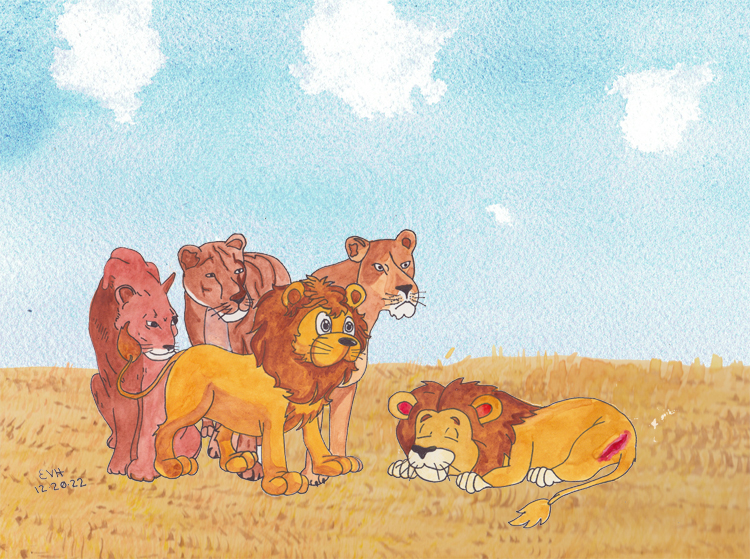
Jataka 397
Manoja Jātaka
The Story of Manoja
as told by Eric Van Horn
originally translated by H.T. Francis and R.A. Neil, Cambridge University
originally edited by Professor Edward Byles Cowell, Cambridge University
This is another story about the company you keep. Unfortunately, we don’t always know who is a good friend. It may take years to discover this. People are complicated and have many layers. And sometimes people who want to do us harm are family members or co-workers. We don’t always get to choose those with whom we associate. This requires great discretion and great discernment. It also means that sometimes—even then—bad stuff happens.
“The bow is bent.” The Master told this story while he was living at the Bamboo Grove. It is about a monk who kept bad company. The occasion was given at length in the Mahilāmukhata Birth (Jātaka 26). The Master said, “Brothers, this is not the first time that he is keeping bad company.” And then he told this story from the past.
Once upon a time when Brahmadatta was reigning in Benares, the Bodhisatta was a lion. He lived with a lioness and they had two children, a son and a daughter. The son’s name was Manoja.
When he grew up, he took a young lioness as his wife, and so they became a family of five. Manoja killed wild buffaloes and other animals, and in this way he fed his parents, sister, and wife. One day when he was in his hunting ground, he saw a jackal named Giriya. Giriya was lying on his belly and unable to run away. “How now, friend?” Manoja said. “I wish to wait on you, my lord,” said the jackal. “Well, do so.”
So he took the jackal to his den. The Bodhisatta saw him and said, “Dear Manoja, jackals are wicked and evil-doers. They give bad advice. Don’t let this one near you.” But Manoja could not be hindered.
Then one day the jackal wanted to eat horseflesh. He said to Manoja, “Sir, there is nothing we have not eaten except for horseflesh. Let us take a horse.” “But where are there horses, friend?” “At Benares by the river bank.” He took this advice and went with him there when the horses were bathing in the river. He took one horse, threw it on his back, and sped off to the mouth of his den. His father, while eating the horseflesh, said, “Dear son, horses are Kings’ property. Kings have many resources. They have skillful archers to shoot. Lions who eat horseflesh don’t live long. After this, do not take any more horses.” But the lion did not follow his father’s advice and went on taking them.
The King heard that a lion was taking the horses. He had a bathing tank for horses made inside the town. But the lion still came and took them. The King had a stable made. He put fodder and water inside it. The lion still went over the wall and took the horses even from the stable. But the King had an archer who shot like lightning. He asked him if he could shoot a lion. He said he could. He built a tower near the wall where the lion came, and he waited there.
The lion came and—posting the jackal in a cemetery outside—sprang into the town to take the horses. The archer thought “His speed is very great,” and he did not shoot him. But when the lion was leaving after taking a horse, he was hampered by the heavy weight. The archer hit him with a sharp arrow in the hind quarters. The arrow came out at his front quarters and flew in the air. The lion yelled “I am shot!” The archer twanged his bow like thunder. The jackal heard the noise of the lion and the bow. He said to himself, “My comrade is shot and must be dead. There is no friendship with the dead. I will now return to my old home in the wood.” Then he spoke two stanzas:
The bow is bent, the bowstring sounds his pain,
Manoja, king of beasts, my friend, is slain.
Alas, I seek the woods as best I may,
Such friendship’s gone. Others must be my stay.
The lion ran hurriedly away. He threw the horse at the den’s mouth, and then he fell dead himself. His family came out and saw him blood stained, blood flowing from his wounds, dead from following the wicked. And his father, mother, sister and wife spoke four stanzas in order:
His fortune is not prosperous whom wicked folk entice,
Look at Manoja lying there, through Giriya’s advice.
No joy have mothers in a son whose comrades are not good,
Look at Manoja lying there all covered with his blood.
And even so fares still the man, in low estate he lies,
Who follows not the counsel of the true friend and the wise.
This, or worse than this, his fate
Who is high, but trusts the low,
See, ’tis thus from kingly state
He has fallen to the bow.

Figure: Dead from following the wicked
Lastly, there is the stanza of Perfect Wisdom:
Who follows outcasts is himself out cast,
Who courts his equals ne’er will be betrayed,
Who bows before the noblest rises fast,
Look therefore to your betters for your aid.
After the lesson, the Master taught the Four Noble Truths. After the teaching, the monk who kept bad company was established in the fruition of the First Path (stream-entry). Then he identified the birth: “At that time the jackal was Devadatta, Manoja was the keeper of bad company, his sister was Uppalavaṇnā, his wife the Sister Khemā, his mother the mother of Rāhula, his father myself.”
(Uppalavaṇnā and Khemā were two of the Buddha’s foremost nuns, and Yasodhara was the Buddha’s wife when he was a layperson. I presume you know by now who Devadatta was. He is Buddhism’s favorite punching bag.)
